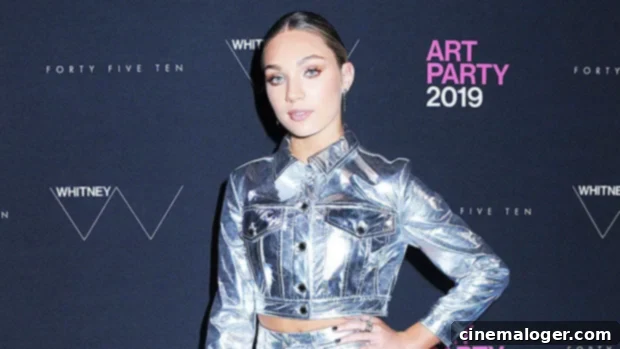Maddie Ziegler Addresses Past ‘Racially Insensitive’ Comments, Reflects on Growth in the Public Eye
In an era where every public figure’s past is subject to intense scrutiny, former Dance Moms star Maddie Ziegler found herself in the spotlight once again, not for a new artistic endeavor, but for resurfaced videos from her childhood. On August 4, 2020, Ziegler, then 17, took to Twitter to issue a comprehensive apology for what she described as “ignorant and racially insensitive” comments made when she was approximately nine years old. This candid statement aimed to address the concerns of her fanbase and underscore her personal evolution, highlighting the unique challenges of navigating a public life from such a tender age.
The apology came after a series of old videos began circulating online, showing a young Ziegler making light of various accents and what she now acknowledges were offensive caricatures. In her lengthy statement, the professional dancer and actress expressed profound remorse. “There are a few videos some of you have seen from when I was about 9 years old where I thought it was funny to mock people and accents,” she began. “I’m honestly ashamed, and I’m truly sorry for my actions. The decisions I made then are absolutely not decisions I would make today.” This opening set a tone of humility and a clear demarcation between her past self and her current understanding.
pic.twitter.com/xoGCuR0VQ5
— Maddie Ziegler (@maddieziegler) August 4, 2020
The Perils of Growing Up in the Public Eye
Maddie Ziegler’s journey into the entertainment industry began at an exceptionally young age, catapulting her into national fame through the reality television series Dance Moms before she was even ten. This unique upbringing, as she explained in her apology, presented distinct challenges that few outside the public eye can fully grasp. “Growing up in the public eye has its challenges,” she articulated. “What I thought was silly humor when I was younger I know was actually ignorant and racially insensitive.” This reflection offers a poignant insight into the development of a child star, where formative years, often marked by experimentation and mistakes, are played out under the constant gaze of millions and forever archived online.
The permanence of digital content means that youthful indiscretions, which might otherwise be forgotten or privately addressed, can resurface years later, leading to public outcry and demanding accountability. Ziegler’s situation underscores a broader societal conversation about “cancel culture” versus genuine growth and the right to learn from past errors. She emphasized this point by stating, “We have all made mistakes in our lives and as we grow up we educate ourselves and learn to be better people. I hope you will forgive me and also hope you realize I have in fact grown up and would never act this way now.” This plea for understanding highlights the significant personal development she has undergone since childhood.
Understanding the Impact of “Ignorant and Racially Insensitive” Comments
While the comments were made by a child, their impact remains significant. “Racially insensitive” remarks, even if unintended or made out of a lack of awareness, perpetuate harmful stereotypes and can cause real pain and offense. Ziegler’s acknowledgement of her past actions as “ignorant” demonstrates a maturing understanding of cultural sensitivity and the importance of respect across all communities. Her apology serves as a vital lesson in taking responsibility for actions, regardless of intent, and recognizing the broader implications of one’s words and gestures.
In today’s interconnected world, empathy and cultural awareness are paramount. Celebrities, particularly those who have cultivated a diverse fanbase, are increasingly expected to be role models for social responsibility. Maddie Ziegler’s public statement, therefore, was not just an apology but also a public declaration of her commitment to personal growth and an affirmation of her evolved values. It speaks to a younger generation’s demand for authenticity and accountability from the figures they admire.
A Call for Positivity Amidst Scrutiny
The apology statement also included a powerful message to her followers, particularly her younger Gen Z fans, regarding how they engage with each other online. Recognizing the potential for a divisive reaction, Ziegler urged her community to foster a positive environment. “I know some of you are hurt and may not accept my apology, but I want to ask all of you to please be kind to each other on socials. There is no need to attack each other or try to defend me. I don’t want anyone to feel bullied and think we can all learn from my mistakes and spread love during these times when we need it most.”
This request for kindness is particularly relevant in the often-toxic landscape of social media, where discussions can quickly devolve into aggressive arguments and online bullying. By asking her supporters not to attack others in her defense, Ziegler demonstrated a maturity beyond her years, effectively de-escalating potential conflicts and redirecting the focus toward collective learning and empathy. Her message resonated with many who champion a more constructive approach to addressing past mistakes and promoting understanding rather than division.

Maddie Ziegler’s Evolution: Beyond Dance Moms
Since her departure from Dance Moms, Maddie Ziegler has consciously carved out a diverse career path, transcending her initial reality TV fame. She has transitioned successfully into acting roles in films like The Book of Henry and Music, showcasing her versatility beyond dance. Her distinctive artistic expression and powerful performances have garnered her a new legion of fans, particularly within the Gen Z demographic, who admire her authenticity and commitment to her craft. This career evolution is a testament to her dedication and a strategic move to establish herself as a multifaceted artist rather than solely a reality television personality.
Her extensive work with pop songstress Sia has been a cornerstone of her post-Dance Moms career, solidifying her status as a compelling performer. Their creative partnership, which began with the iconic “Chandelier” music video, has produced a string of visually striking and emotionally resonant projects. This long-standing collaboration has allowed Ziegler to explore various artistic expressions and reach a global audience, proving her talent extends far beyond the competitive dance studio. The enduring nature of their professional bond speaks volumes about Ziegler’s talent and Sia’s trust in her artistic interpretations.
Creative Collaborations: The “Joe Exotic” Tune During Quarantine
Amidst the global lockdown in 2020, Maddie Ziegler and Sia continued their creative synergy, producing new content that captured the zeitgeist. One notable project during this period was their collaboration on the track “Joe Exotic,” a rap song inspired by the then-ubiquitous Netflix documentary series Tiger King. Released on April 25, 2020, the song was a playful and timely response to the cultural phenomenon, providing a much-needed dose of levity during a challenging time.
The accompanying video featured both Maddie and Sia embracing the outlandish aesthetics of the Tiger King world. They donned animal prints, crop tops, and sunglasses, mimicking the distinctive styles of the documentary’s colorful characters. This project, co-written by Maddie Ziegler herself and makeup artist Tonya Brewer, was filled with numerous references to the show, showcasing their ability to engage with popular culture in a fun and creative manner. The “Joe Exotic” collaboration served as a reminder of Ziegler’s evolving artistic range and her ability to adapt to different creative outlets, even while navigating personal scrutiny and a global pandemic.
Reflecting on Accountability and Growth in the Digital Age
Maddie Ziegler’s apology and the subsequent public discourse around it reflect broader societal considerations concerning accountability, personal growth, and forgiveness in the digital age. The internet, while a powerful tool for connection and information, also serves as an indelible archive, making it challenging for individuals, especially those in the public eye, to escape past mistakes. Her situation highlights the importance of empathy in these conversations, recognizing that people grow and evolve, and that early childhood missteps do not necessarily define an adult’s character or values.
Ultimately, Ziegler’s heartfelt apology and her call for kindness underscore a crucial lesson: while past actions require acknowledgement and genuine remorse, there is also immense value in allowing individuals the space to learn, grow, and contribute positively to society. Her journey, from child star to a maturing artist grappling with public scrutiny, offers a compelling case study in navigating the complexities of celebrity, responsibility, and personal evolution in an unforgiving online world. It emphasizes that growth is a continuous process, and the ability to confront one’s past with honesty is a mark of true maturity.
